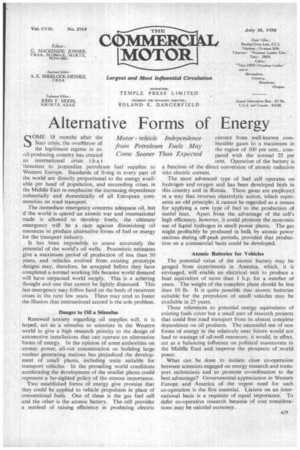Alternative Forms of Energy
Page 37

If you've noticed an error in this article please click here to report it so we can fix it.
SOME 18 months after the Suez crisis, the overthrow of the legitimate regime in an oil-producing country has created an international crisis that 'threatens to jeopardize petroleum fuel supplies to Western Europe. Standards of living in every part of the world are directly proportional to the energy available per head of population, and succeeding crises in the Middle East re-emphasize the increasing dependence industrially and domestically of all European communities on road transport.
The immediate emergency concerns adequate oil, but if the world is spared an atomic war and international trade is allowed -to 'develop freely, the ultiniate emergency will be a race against diminishing oil resources to produce alternative forms of fuel or energy for the transport industry.
It has been impossible to assess accurately the potential of the world's oil wells. Pessimistic estimates give a maximum period of production of less than 30 years, and vehicles evolved from existing prototype designs may, therefore, be scrapped before they have completed a normal working life because world demand will have surpassed world supply. This is a sobering thought and one that cannot be lightly dismissed. This last emergency may follow hard on the heels of recurrent crises in the next few years. These may tend to foster the illusion that international accord is the sole problem.
Danger to Oil a Stimulus Renewed anxiety regarding oil supplies will, it is hoped, act as a stimulus to scientists in the Western world to give a high research priority to the design of automotive installations that can operate on alternative forms of energy. In the opinion of some authorities on atomic power, all-out concentration on building large nuclear generating stations has prejudiced the development of small plants, including units suitable for transport vehicles. In the prevailing world conditions accelerating the development of the smaller plants could represent a far-sighted policy of the utmost importance.
Two established forms of energy give promise that they could be applied to vehicle propulsion in place of conventional fuels. One of these is the gas fuel cell and the other is the atomic battery. The cell provides a method of raising efficiency in producing electric current from well-known combustible gases to a maximum in the region of 100 per cent., compared with the normal 25 per cent. Operation of the battery is a function of the direct conversion of atomic radiation into electric current.
The most advanced type of fuel cell operates on hydrOgen and oxygen and has been developed both in this country and in Russia. These gases are employed in a way that reverses electrolytic action, which represents an old principle; it cannot be regarded as a means for applying a new type of fuel to the production of useful heat. Apart from the advantage of the cell's high efficiency, however, it could promote the economic use of liquid hydrogen in small power plants. The gas might profitably be produced in bulk by atomic power stations during off-peak periods, provided that production on a commercial basis could be developed.
Atomic Batteries for Vehicles The potential Value of the atomic battery may be gauged from experiments in America, which, it is envisaged, will enable an electrical unit to produce a heat equivalent of more than 1 h.p. for a number of years. The weight of the complete plant should be less than 10 lb. It is quite possible that atomic batteries suitable for the propulsion of small vehicles may be available in 25 years.
These references to potential energy equivalents of existing fuels cover but a small part of research projects that could free road transport from its almost complete dependence on oil products. The successful use of new forms of energy in the relatively near future would not lead to wastage of oil-well resources; it would, in effect, act as a balancing influence on political manceuvres in the Middle East and improve the prospects of world peace.
What can be done to initiate close co-operation between scientists engaged on energy research and transport technicians and so promote co-ordination to the best advantage? Governmental appreciation in Western Europe and America of the urgent need• for such co-operation is the first essential. Liaison on an international basis is a requisite of equal importance. To defer co-operative research because of cost considerations may be suicidal economy.
















































































































